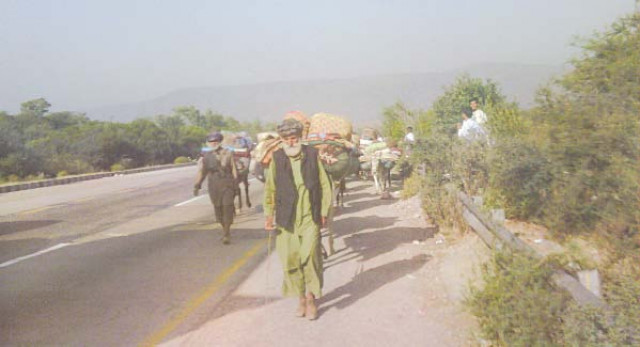Come winter, the descent begins
'Do not add us to the long list of your modern life worries,' say nomads as govt fails to better their lives.

Their caravans can be seen along the roads of Kohistan, Mansehra and Abbottabad. They are moving with their animals to towns and cities of Punjab.
“We have come here from Balakot and will go up to Rahim Yar Khan and Bahawalpur where we will stay till the end of winter with some of our old contacts and relatives who work on the farms,” said Bostan Ali, the head of a nomad family. They were on the GT Road heading eastwards.
“Usually we sell honey, home-made edibles, oil, goats or sheep to make a living for our families. We will return by around April or May to roam the mountains in Balakot and Kaghan when it starts getting warmer,” he said talking about the nomad way of life.
They travel the countryside carrying their belongings and pitching tents wherever they stop. The transient lifestyle that discards permanent settlements is their chosen way of life. Nobody has forced it on them. But they do not mind. In fact they wonder how could people live at the same place all their lives.
“We don’t know why people regard us with contempt. We are happy and satisfied with our lifestyle. We take meals three times a day and rarely sleep on an empty stomach,” said Rehmat Ali, the elder son of Bostan.
These nomads, who come from the mountains of Kohistan and Mansehra, are quite different from the nomads of Sindh and Punjab. The nomads from Punjab and Sindh have an orthodox, primitive lifestyle. The men usually sleep during the day and herd cattle at night. The women collect wood for fire and fetch water and beg on the roadside, often singing folk songs.
On the other hand, the Hazara nomads do not ever beg or entertain people for money.
“Most of the nomads from Punjab and Sindh are involved in illegal activities. While throughout my 30 years in police department, I never received any such reports about nomads from upper Hazara division,” said M Ikram, a senior police officer.
Surveying his family and his belongings, Shahbaz, 39, another family head who was leading his clan from Siri Pae near Babusar top (Kaghan Valley) looked immensely pleased with his life. He had no complaints.
“What could be better than going to new places and leading a life free of too many obligations that permanent settlement brings,” he said, and added, “We move on if there’s a problem.”
Saira Khan, who works with an NGO, was utterly dismayed. “We tried our best [in the past] to help them in uplifting their social values and give education to their children but, I must admit, we failed.”
“Government and social welfare organisations have failed in their efforts to bring a change in their lives. The nomads are not ready to abandon their nomadic culture,” says Ibrahim Shinwari, a senior journalist of Khyber-Pakhtunkhwa.
He added, “What can we do, if they are happy with their lives and do not want to change.”
Shahbaz retorted when pressed about his nomadic lifestyle, “Leave us alone. Do not add us to the long list of your modern life worries.”
Published in The Express Tribune, November 5th, 2010.



















COMMENTS
Comments are moderated and generally will be posted if they are on-topic and not abusive.
For more information, please see our Comments FAQ